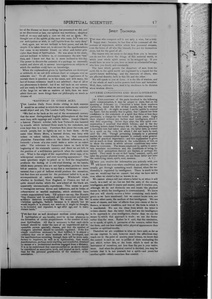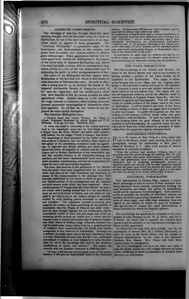< Disorganization Among American Spiritualists (continued from page 3-145) >
The Prince and company were utterly horrified, and, losing all self-possession, called on Heaven for help, and besought Schrepfer to dismiss the apparition; but this be was unable or pretended to be unable to do, and those present declared that nearly an hour elapsed before it could be compelled to retreat And when at length it had gone, and the company were recovering, the door burst open again, and the same hideous form again presented itself! The boldest were not proof again it this, and a scene of utter horror sad dismay trotted, till Schrepfer at length contrived finally to dismiss me apparition.
Of the nineteen persons who witnessed this fearful sight, three afterwards published some account, though none liked to make it a subject of conversation, and the horror impressed upon them was never forgotten throughout life. The story was once well known throughout Europe. Byron alludes to it at the end of the last canto of Don Juan. Schrepfer afterwards became a celebrated medium, and was surrounded by crowds of followers and inquirers, and rumors survive of astounding manifestations made through him. The present writer once, in Egypt, met a Russian, who since has “passed the river," who related some details respecting him not then appreciated, and now indistinctly remembered. What is recollected would seem to argue him endowed with prodigious materializing force.
Schrepfer lived a strange life, and a strange death he died. He had promised three gentlemen, whom he had in some method initated. to show them something more wonderful than ail before; and in the summer, before sunrise, between three and four o’clock, he took them to the wood of Rosendaal, a little beyond the gates of Leipsic. Here he desired them to remain awhile, and went apart amongst the trees. Presently they heard the report of a pistol, and, going up, found he had shot himself. He was senseless, and soon died. Those who knew him best declared that he was so perpetually beset and tormented by spirits, and his life made so miserable, as to drive him to have resource to a pistol. He does not appear to have been distinguished for any other qualities, and, as in many other instances when it is asked why the spiritual world favors persons otherwise not at all noteworthy, and why powers so extraordinary are conferred apparently with so little discrimination, one can only say, as Charles Lamb said of Spencer’s Faery Land, “We do not know the laws of that country.”
"Rappings" in Other Ages
The London Daily News thinks sitting in dark seances would be an ordeal to which the most enthusiastic scientist would object and yet, The London Daily News says: —
“We find so far back as the end of the seventeenth century that the most distinguished English philosophers of the time were busy with rappings and volatile tables. Joseph Glanvil, a famous Platonic scholar, tells how Tedworth was haunted by sounds which imitated those made by the onlookers, and even kept time to a tune. Furniture flew about the room, and struck people, but so lightly as not to hurt them. At the same time Henry More, a learned divine, was busy with noises on oaken tables, which, says he, ‘that conceited physician Paracelsus refers to the Sideral influences, as if, forsooth! a beam of a star conld make a noise on an oaken table.’ The reference to Paracelsus takes us back to the beginning of the sixteenth century, and there we are left, in the position of a well-known patriarch when the candle went out. What is the origin of the superstition about raps, of its wide-spread existence and ever recurring appearance? The same questions might be asked as to how the imagination produces the feeling of a cold wind blowing on the hands, which many persons who are not Spiritualists profess to have felt at seances. It is easy to say that a mechanism no more unusual, than a pair of bellows would produce the sensation, but that does not account for the persistent belief in it, as an accompaniment of unholy meetings. Witchcraft trials, whether in Scotland, New England, or France, are full of quite absurd stories which the new school of the black art, apparently unconsciously, reproduces. This seems to point to contagious nervous forces and influences, and to forms of schwarmerei or morbid exaltation, which obviously have certain unascertained laws. Till science can say, like Horatio ‘Stay illusion,’ and be analyzed, all this concurrent and absurd evidence deserves investigation. We would not, like the Christian apologist, ‘believe because is it absurd,’ but we would inquire it is absurd, too much so, it might be thought, to be invented and repeated, in age after age, and in many distant lands.”
Deserved Compliments
The whirligig of time has brought about few more startling changes, than the favorable notice of a work on Spiritualism by one of the most conservative of our magazines which we append to these paragraphs. The American Bibliopolist” is a prominent organ of the book-buyers and book students of this country, and praise from its erudite and cautious editors is seldom given without stint. Their appreciative view of Col. Olcott's great work entitles the Bibliopolist to the respect of the whole body of educated Spiritualists, and places it in most favorable contrast with its contemporary magazines, which, as a rule act the very dishonorable part of misleading the public by wilful misrepresentation of fact.
The notice of the Bibliopolist will first apprize many Spiritualists of the fact that Col. Olcott is well known in other branches of literature than ours. As early as 1857, when a young man of 25, he received the thanks of the Imperial Acclimation Society of France for a work of his upon the sugarcane; and two medals and a silver vase were awarded to him by various societies for other agricultural works. Besides these, he is the author of two large volumes on Insurance, which leading insurance journals pronounce encyclopedias of information about their specialty. In all that he has written he has displayed the same candor throughout.
The American Bibliopolist says: —
2. People from the other World. By Henry S. Olcott Profusely illustrated by Alfred Kappes and T. W. Williams. 8 vo, pp. xvi., 492. (Hartford, 1875.)
In every way equal in authorship to the volume above noticed is the remarkable work, also by Col. Olcott, entitled “People from the Other World,” and which most undoubtedly realizes the old adage, “Truth is stranger than fiction.” The assemblage of facts presented by the author are of so extraordinary a character that the ordinary mind cannot but feel aghast at the astonishing revelations made by a gentleman of high-tone and literary abilities, and whose position places him above all suspicion of collusion and the ordinary stigma laid on Modern Spiritualism in this materialistic age, that this so-called Science is all moonshine, humbug and quackery, and that these “manifestations” never occur except under pecuniary considerations, and then are manipulated for dupes by clever and unscrupulous imposters.
For some time previous to the publication of Col. Olcott’s work the public were made acquainted with the occurrences which took place at the Eddy homestead and elsewhere, by means of the communications in the principal New York journals, contributed by Col. Olcott, in which he gave a clear and faithful account of his investigations, and the impartial yet strict manner under which they were conducted. After a careful perusal of “People from the Other World” we cannot but concur with a leading journal that it is “as marvellous a story as any to be found in history, and one which we consider it our duty to say to our readers, should be carefully studied by every thinking person interested in man’s here and hereafter.” The arguments founded on existing facts urged by the author, are more convincing on the question of immortality than the Phoedo of Plato or any other work— here we have brought together for our wonderment, Spirits materialized, Spirits of every size and shape, and in the unhesitating proofs arrayed, we realize how it comes that discoverers, men of science and intellect like Professors Crookes and Hare, Alfred R. Wallace, Judge Edmonds, Serjeant Cox, and we cow id name many others, have by a gradual process of evolution been transferred, like Col. Olcott, from hostile antagonists to firm believers in Spiritualism. Although not a believer, we would again ask, as we have elsewhere, —How is it that Dialectical Societies and the like “are confounded and obliged to confess an utter Incapacity to solve the problems by aid of the knowledge they have of the wondrous ramifications of nature and science?” We cannot but coincide with the Scientific American in observing that —
“If true, it will become the one grand event of the world’s history; it will give an imperishable lustre to the nineteenth century. Its discoverer will have no rival in renown, and his name will be written high above any other…...If the pretensions of Spiritualism have a rational foundation, no more important work has been offered to men of Science than their verification;’’ and we would add further, that if these remarkable developments are substantiated, Spiritualism “would be one of the greatest blessings to the human race, would effectually rid us of Atheism and its attendant gloominess, and would satisfactorily dispose of Materialistic objections to the Immortality of the soul.”
<... continues on page 3-147 >
Editor's notes


